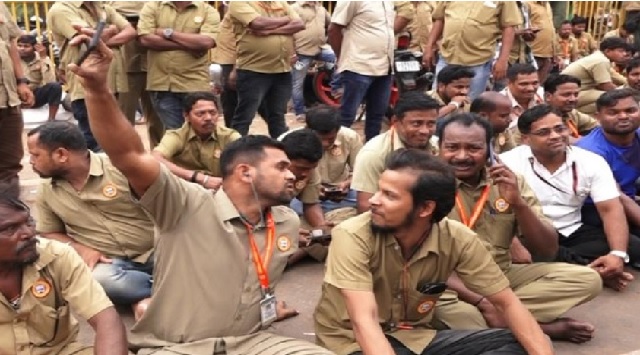Bhubaneswar: A widespread and indefinite strike by drivers across Odisha has entered its third day, bringing public and commercial transportation to a grinding halt. Spearheaded primarily by the Odisha Drivers’ Mahasangha, the “steering wheel off” agitation, which began on Tuesday, July 8th, has left millions of commuters stranded, severely disrupted supply chains, and raised alarm over an impending fuel crisis.
The early morning hours today, much like the preceding days, saw bus stands, railway stations, and taxi stands deserted across major cities including Bhubaneswar, Cuttack, Balasore, Rourkela, Berhampur, and Bolangir. Thousands of drivers have parked their vehicles in solidarity, causing immense hardship. School children, daily wage earners, and office commuters were among the hardest hit, scrambling for alternative modes of transport, often resorting to overcrowded Odisha State Road Transport Corporation (OSRTC) and Capital Region Urban Transport (CRUT) buses, shared auto-rickshaws, or even walking long distances. Many businesses reported significant drops in employee attendance, while essential services faced challenges in staff mobility.
“I’ve been waiting for over two hours, and there’s not a single private bus,” lamented Priya Sharma, a daily commuter trying to reach her office in Bhubaneswar. “My work depends on me being on time, and this strike is just making it impossible.”
The strike’s primary demands, articulated by the Odisha Drivers’ Mahasangha, revolve around a seven-point charter focused on driver welfare and opposition to recent policy changes. Key demands include:
- Exemption from police checks on vehicles: The union opposes the government’s decision to grant vehicle-checking authority to the police, arguing it leads to harassment.
- Construction of restrooms and parking facilities: Demanding rest sheds and toilet facilities every 100 km along state highways.
- Pension for drivers above 60 years of age.
- Death benefits and compensation for accident-related work incapacitation.
- Inclusion of auto-rickshaw drivers in the Driver Welfare Board.
- Protection against assaults on drivers.
- Preferential job allocation: A demand for at least 70% of driver jobs in mining and industrial areas to be reserved for Odia drivers.
- Declaration of September 1 as ‘Drivers’ Day’.
The impact on the state’s economy is already palpable and intensifying. Agricultural produce from areas like Angul, Bargarh, Jajpur, and Puri is struggling to reach markets, leading to potential price hikes for consumers and significant losses for farmers. Industries reliant on timely raw material delivery are facing production delays. The tourism sector has also taken a severe hit, with tourists unable to access popular destinations.
However with State Government’s intervention, Oil Marketing Companies have helped out to ease supply of Petrol, Diesel in the petrol pumps.ACS Home Satyabrata Sahu convened a Meeting of District Magistrates and Superintendent of Police last night.
In response to the escalating crisis, the State Government has appealed to the striking drivers to return to work. Transport Minister Bibhuti Bhusan Jena stated, “We understand their concerns and are open to dialogue, but disrupting essential services is not the solution. We urge them to come to the negotiating table immediately.” High-level meetings, including sessions at the Transport Minister’s residence and Kharavela Bhavan in Bhubaneswar, have been held, with the government reportedly showing openness to several demands, including the recognition of September 1 as ‘Driver’s Day’ and addressing welfare measures. A dedicated task force has been constituted to ensure the uninterrupted movement of essential commodities, including petroleum products, with security escorts being provided where necessary.
However, union leaders remain resolute. Prashant Menduli, President of the Odisha Drivers’ Mahasangha, has declared that the strike will not be called off until the government provides a written assurance that their demands will be met. The absence of the union president from some of the recent meetings has also added a layer of uncertainty to the negotiations.
Emergency services, including ambulances and fire brigades, have been exempted from the strike, and the Mahasangha has reportedly ensured smooth passage for vehicles supplying essential commodities to minimize public hardship. However, their movement is still affected by the general disruption. Law enforcement agencies are on high alert to prevent any untoward incidents and ensure public order.
As the deadlock continues and negotiations are yet to yield a definitive breakthrough, the state braces for further disruption. Citizens are advised to plan their travel accordingly and stay updated on developments. The coming days will be crucial in determining how quickly normalcy can be restored and whether the government and the striking drivers can find common ground to end this crippling impasse.


